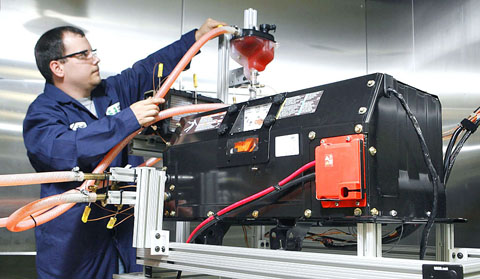The new General Motors Co (GM) plans to register 3.5 billion shares of stock to ready itself for a public offering sometime next year, using the proceeds to repay at least part of what it owes the US government and other stakeholders.
GM disclosed in a filing with the US Securities and Exchange Commission on Friday that it would register 2.5 billion common and 1 billion preferred shares in preparation for the public sale. Its executives and the government have said they expect the sale sometime next year, but no date has been disclosed.
Spokeswoman Julie Gibson said the company was merely authorizing 3.5 billion shares, but likely would not sell that high a number in an initial public offering.

PHOTO: EPA
It is common practice, she said, for companies to register more shares than they issue.
Current GM stakeholders include the US government, which now owns 61 percent of the Detroit company. So far GM has received US$50 billion in US government aid, some of which is to be repaid with the stock sale.
GM emerged from bankruptcy on July 10 after a lightning-quick 40-day stay, cleansed of much of its debt and burdensome contracts.
Its good assets were sold to a new company.
Just before it filed for bankruptcy protection, GM had about 611 million shares outstanding, but those shares stayed with the old GM, which now is mainly a collection of debt as well as closed plants and bad assets waiting to be liquidated.
The company also disclosed on Friday that it will not report second-quarter earnings this year, but it will disclose its performance for the three-and nine-month periods to Sept. 30.
Those reports will come after the third quarter closes, and the company says they will not comply with general US accounting principles.
Meanwhile, Australia said yesterday it had extended a A$200 million (US$170 million) lifeline to car maker GM Holden following the bankruptcy of General Motors, its ailing US parent.
Australian Industry Minister Kim Carr said the credit, which had not yet been drawn upon by Holden, was agreed a month ago as part of a broader effort to save more than 200,000 jobs in Australia’s automotive sector.
The Export Finance and Insurance Corporation (EFIC), the government’s export credit agency, said Holden was an “iconic Australian company” which deserved full support.
“The facility has been put in place to provide support for GMH exports of vehicles, parts and engineering services to Europe, the Middle East, Africa and Asia, as the Australian manufacturer establishes stronger market links under the newly created General Motors Company,” EFIC said.

Quanta Computer Inc (廣達) chairman Barry Lam (林百里) is expected to share his views about the artificial intelligence (AI) industry’s prospects during his speech at the company’s 37th anniversary ceremony, as AI servers have become a new growth engine for the equipment manufacturing service provider. Lam’s speech is much anticipated, as Quanta has risen as one of the world’s major AI server suppliers. The company reported a 30 percent year-on-year growth in consolidated revenue to NT$1.41 trillion (US$43.35 billion) last year, thanks to fast-growing demand for servers, especially those with AI capabilities. The company told investors in November last year that

United Microelectronics Corp (UMC, 聯電) forecast that its wafer shipments this quarter would grow up to 7 percent sequentially and the factory utilization rate would rise to 75 percent, indicating that customers did not alter their ordering behavior due to the US President Donald Trump’s capricious US tariff policies. However, the uncertainty about US tariffs has weighed on the chipmaker’s business visibility for the second half of this year, UMC chief financial officer Liu Chi-tung (劉啟東) said at an online earnings conference yesterday. “Although the escalating trade tensions and global tariff policies have increased uncertainty in the semiconductor industry, we have not

Intel Corp has named Tasha Chuang (莊蓓瑜) to lead Intel Taiwan in a bid to reinforce relations between the company and its Taiwanese partners. The appointment of Chuang as general manager for Intel Taiwan takes effect on Thursday, the firm said in a statement yesterday. Chuang is to lead her team in Taiwan to pursue product development and sales growth in an effort to reinforce the company’s ties with its partners and clients, Intel said. Chuang was previously in charge of managing Intel’s ties with leading Taiwanese PC brand Asustek Computer Inc (華碩), which included helping Asustek strengthen its global businesses, the company

Power supply and electronic components maker Delta Electronics Inc (台達電) yesterday said it plans to ship its new 1 megawatt charging systems for electric trucks and buses in the first half of next year at the earliest. The new charging piles, which deliver up to 1 megawatt of charging power, are designed for heavy-duty electric vehicles, and support a maximum current of 1,500 amperes and output of 1,250 volts, Delta said in a news release. “If everything goes smoothly, we could begin shipping those new charging systems as early as in the first half of next year,” a company official said. The new